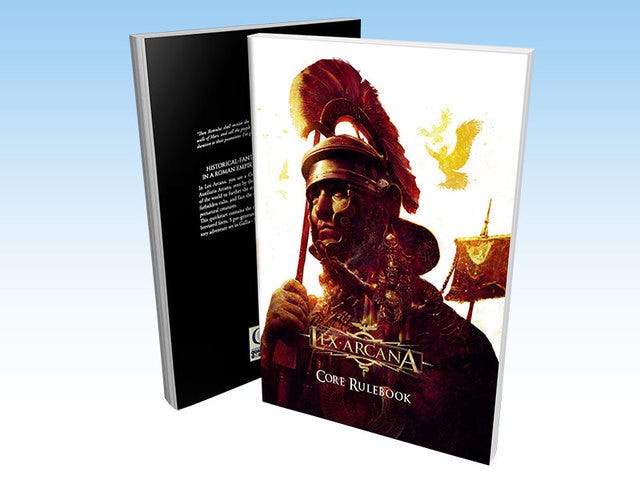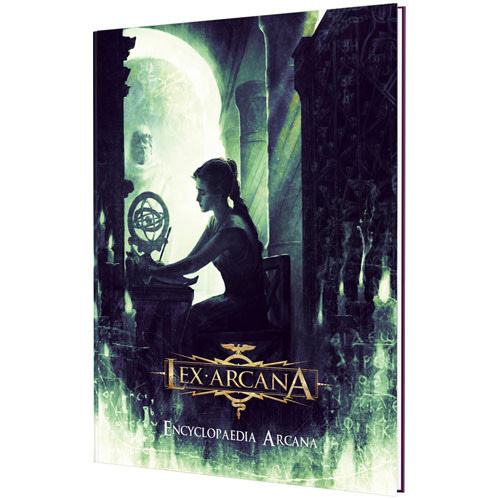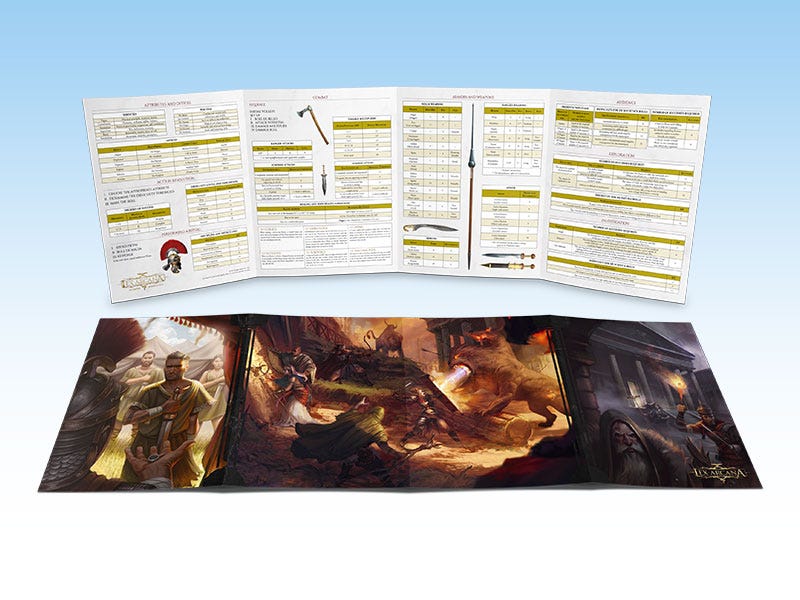Review: Lex Arcana RPG
Plus the Demiurge Screen...and the Encyclopedia Arcana.
I have to thank one of my Facebook acquaintances and fellow game design/small publisher for this one: Lex Arcana. It looked interesting, and our Dungeons & Dragons campaign had been set in an alternate late antiquity Roman Empire, so I was interested in it for material to crib. After hearing it was a good system, but picked up the PDF and read through it. Then bought the Encyclopedia Arcana, their "sourcebook" on the setting in PDF. Then found a print version of both, plus the "Demiurge" (GM) screen online picked them up.
Apparently, this had been a popular game in Europe in the 1990s, and recently has had material regularly being released through Kickstarter. First off: these books are gorgeous! The artwork is as good, and in many ways better ,than the stuff Wizards is doing for D&D. Production values are high -- the paper quality, binding, layouts -- it's all just top shelf. This was easily one of the best buys for an RPG I've dropped money on in recent years. So much so, I’ve been backing for the last four years. I even made a point of stopping by their GenCon booth to say “ciao”.
So, it's pretty. How's the system? Character creation can be a bit confusing at first, but I followed the flow chart they'd laid out in the book and had a version of one of my player's characters from the D&D campaign banged out in under 15 minutes. Not bad -- I do then judge a game system based off of how long and how difficult character creation is. If I can’t knock out a character in 15 minutes or so and get playing, I'm not usually impressed. There is a bit of weirdness where your attributes -- strength, etc. don't directly apply to things you do; they combine into....fields, I guess would be a good way to put it, like War or Nature or Society. This gives you a number from 2 to 18 (18 being the top starting number). You pick skill, which gives you a modifier to rolls in a certain field -- bows in War, for instance. You pick your weapons and armor, and you're ready to go.
The conceit here is you are part of a special force of the Praetorian Guard that hunts down mystic weirdness and threats to the Empire — a sort of X'-Files in the Roman Empire. There are rules for rising through the ranks, for magic, and more importantly, for gaining favor from your patron deities. The piety score can be used to gain a bump in a test up to getting a bit of Olympian back-up. Magic here is not the "shoot fireballs from your fingers" stuff of D&D (thank the gods!) and focuses on pre- and post-cognition, interpreting omens and dreams, scrying, and manipulating the gods for favors. This is low magic that requires rituals, time, and effort to get something out of it.
The basic mechanics is a target number based on the difficulty of a task. How you do this is different...you get all the normal polyhedral dice for the game, but which ones you roll -- that's the difference. For instance, if I have a de Bello (War) of 16, I can chose dice that add to 16 (up to three dice, no more) -- so I could do a d12+d4, or 2d8, or 2d6+d4. What's the point of this? you ask. It allows you to maximize the lowest result you can get. Three dice rolled means you always hit a 3, the target number for easy tasks. However, it is an exploding dice system; if you roll the maximum on a die, you get to reroll and add the next result to your total. Bigger dice and a bigger risk, but if you get the max result, you can see real results — especially in combat. It can be confusing and slow play for new players, but as we got used to it, the players were gaming the hell out of this for mathematical benefit. One artifact you get is also the chance of an odd-numbered die — a d5, d7?
Combat is pretty straightforward, with damage based on the quality of your hit. For every three over the TN, you gain a multiplier to the weapon damage. Damage here can be pretty deadly. Fights are dangerous.
The downsides: there's a lot of Latin used to give the game flavor. Your fields are virtutes are attributes, the peritiae your “fields”, like de Bello (War) or de corpore (Body). It lends a nice touch to the game, but it did annoy a few of the players that weren’t linguist types. The rest of us rolled with it.
The core book cost me about $50. Is it worth it? Hell, yes. This is the first game one of my players -- a Romanophile -- was truly, actively interested in playing; another is a late antiquity historian turned acupuncturist -- he was in, as well. It's pretty, well-designed, and there's a lot you could crib for a setting or another game system.
Instead of doing a different review, I figured I'd merge this with a few other Lex Arcana products I had picked up. Easily, the best sourcebook I've read in some time is the Encyclopedia Arcana.
This book is a genuine book of scholarship tweaked to be a setting guide for ancient Rome. There's stuff on the road systems, the post service, the military (army and navy), shipping and trade, the ranks of government and society, as well as food, clothing, disease, and lastly magic. Written by Francesca Garello — a lovely person, by the way — it's well worth picking up even if you don't get the game for the setting. This was about $40 and yes, it's worth every penny. The art, writing, research, and production values are sine que non.
Lastly, the Demiurge Screen. Most GM screens are of questionable utility. this one is not. Everything you need to adjudicate social interactions, combat, travel, and other common tasks is on the screen, including weapons damages. As screens go, this is one of the better ones.
So is it worth it? Yes.






